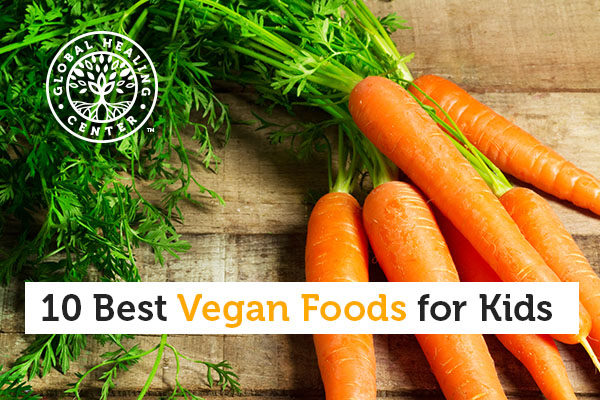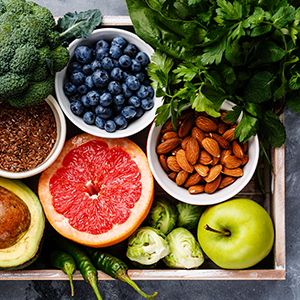
Once children start consuming solid food, life-long eating habits begin to take root. What they learn from parents, friends, and others will shape the way they eat. This means that even when a child is young, nutritional education is extremely important for laying the groundwork for their habits and health. And, the evidence is clear, children who consume a nutritious diet at a young age are likely to stick with it and have a greater chance of avoiding health concerns later on in life. There is no question that a vegan diet, void of animal products, refined sugars, and processed junk, can provide the full spectrum of nutrients that active, growing bodies need. To help remove the guesswork, here are 10 great vegan foods for your child!
Vegan Foods for Kids
1. Carrots
Carrot sticks are a great snack! Loaded with beta-carotene, carrots are a great choice for promoting eye health and skin integrity. [1] [2] Carrots are an excellent source of antioxidants and offer protection against the damaging effects of free radicals. Vitamin A is a fat-soluble vitamin, so consuming the vegetable with a nut butter or some type of healthy, unrefined oil (olive or coconut oil) is helpful for increasing absorption.
2. Almond Butter
Peanut allergies are common in children and more people are turning to peanut butter alternatives. Almond butter, a more nutritious, tastier nut butter, is quickly becoming a favorite to many. Parents like it because it offers a dense source of calories for their growing, active children. Also, almond butter contains a good source of vitamin E, calcium, and protein. Vitamin E is a fat-soluble vitamin and acts as a potent antioxidant that supports neural health and brain development. [3] Calcium and moderate levels of protein are helpful for increasing bone density, a great benefit for developing children. [4]
3. Oranges
Oranges are packed with vitamin C, a nutrient responsible for collagen synthesis. Collagen is essential for muscle development, making vitamin C something every kid needs. [5] It's also an incredibly important vitamin for maintaining the quality and strength of the immune system. [6] Children are often more susceptible to sickness, especially when they begin to socialize more during school and extracurricular activities.
4. Bananas
This kid-friendly fruit provides a good source of magnesium and potassium – nutrients essential for growth and nerve function. Bananas are also an excellent source of vitamin C and B6, both of which are necessary for physical and mental development. [7] While bananas may not be the most nutrient-dense food on the planet, kids love its easy, natural wrapper and sweet taste.
5. Green Vegetables
When it comes to giving your child a nutritious meal, you can't go wrong with vegetables. The old image of a whiney kid not wanting to eat his Brussels sprouts doesn't have to be true. Fresh green vegetables that are roasted, grilled, sautéed in olive oil, or even served raw can be more appealing to children of all ages compared with mushy, canned varieties. Plus, fresh vegetables retain more of their nutritional value, offering an advantage over canned alternatives.
6. Berries
Like bananas, strawberries, blueberries, and blackberries are very popular with children. They contain very little sugar and are an excellent source of vitamin C, K, calcium, and magnesium – nutrients that are important for bone health. [8]
7. Apples
"An apple a day keeps the doctor away!" Apples are a powerful fruit shown to promote skeletal muscle and discourage subcutaneous body fat. [9] They're a good source of fiber and promote regularity. Be aware, however, that apple juice is not as good as eating an apple. Apple juice is often pasteurized and contains very little of its original nutrient content. It's largely sugar water that can aggravate blood sugar levels and energy issues in both kids and adults.
8. Sunflower Seeds
Whether roasted or raw, these vitamin-packed seeds are a wonderful vegan snack. Sunflower seeds are a good source of thiamine, or vitamin B1, a nutrient shown to promote mental acuity. [10] An easy-to-eat, tasty snack food, sunflower seeds also contain vitamin E, a powerful antioxidant. High in protein, fiber, and healthy fat, they're great for satiating your appetite (making you feel full). Great for fueling a child for a busy afternoon.
9. Oats
If your child loves oatmeal, you can rest easy knowing that it's giving them an excellent source of essential nutrients and fiber. It's great at keeping your child full until lunch and helps them avoid hunger pangs and energy lulls. This is very important for maintaining a child's focus in the classroom. New studies continue to examine the antioxidant and anti-inflammatory properties contained in oats, such as vitamin E, beta-glucans, and avenathramide. [11] Parents should watch out for the easy-to-use, but less-than-nutritious oatmeal that contains a hefty amount of sugar. Also, children with Celiac disease or gluten intolerance (and probably everyone, really) should only choose oats that have been certified gluten free.
10. Avocados
Did you know avocados are considered a fruit? High in monounsaturated fats, avocados may support brain health and mood – benefits that play a crucial role in supporting a child's academic performance. [12] Studies suggest that avocados may even help reduce the risk for developing diabetes. [13] Considering that diabetes in children is a rising concern, adding avocado to your child's diet may be a great strategic move!
Investing in Your Child's Future
It's important to introduce your kids to healthy foods when they're young; it really will lay the foundation for their future choices. With that in mind, you should also be cautious about going for the quick, simple options that are so many processed, pre-packaged foods. It's easy to just throw some frozen glop in the microwave and it doesn't take much time, something that's a premium for many parents, but it's just not a good idea. Plan ahead and provide a few options so they can be involved in choosing healthy foods that they enjoy, without becoming too dogmatic about what they can and can't eat.
References (13)
- George Wolf. The Discovery of the Visual Function of Vitamin A. Journal of Nutrition. June 1, 2001 vol. 131 no. 6 1647-1650.
- Elaine Fuchs. Regulation of terminal differentiation of cultured human keratinocytes by vitamin A. Cell. Volume 25, Issue 3, p617-625, September 1981.
- David P. R. Muller. Vitamin E and neurological function. Molecular Nutrition & Food Research. 22 February 2010. DOI: 10.1002/mnfr.200900460.
- Bess Dawson-Hughes. Calcium and protein in bone health. Proceedings of the Nutrition Society. Volume 62, Issue 02. May 2003, pp 505-509.
- Stephen Welle. Turnover of Specific Proteins. Collagen. Human Protein Metabolism. 1999.
- Ströhle A, Hahn A. Vitamin C and immune function. Med Monatsschr Pharm. 2009 February;32(2):49-54.
- MK Gestuvo WW Hung. Common dietary supplements for cognitive health. Aging health. February 2012; 9(1): 89-97.
- Tucker KL. Osteoporosis prevention and nutrition. Current Osteoporosis Reports. 2009 December;7(4):111-7.
- Steven D. Kunkel, Christopher J. Elmore, Kale S. Bongers, Scott M. Ebert, Daniel K. Fox, Michael C. Dyle, Steven A. Bullard, Christopher M. Adams. Ursolic Acid Increases Skeletal Muscle and Brown Fat and Decreases Diet-Induced Obesity, Glucose Intolerance and Fatty Liver Disease. PLOS One. June 20, 2012. DOI: 10.1371/journal.pone.0039332.
- Benton D, Griffiths R, Haller J. Thiamine supplementation mood and cognitive functioning. Psychopharmacology (Berl). 1997 January;129(1):66-71.
- Chu YF, Wise ML, Gulvady AA, Chang T, Kendra DF, Jan-Willem van Klinken B, Shi Y, O'Shea M. In vitro antioxidant capacity and anti-inflammatory activity of seven common oats. Food Chem. 2013 Aug 15;139(1-4):426-31. doi: 10.1016/j.foodchem.2013.01.104.
- Arsenault D, Julien C, Chen CT, Bazinet RP, Calon F. Dietary intake of unsaturated fatty acids modulates physiological properties of entorhinal cortex neurons in mice. Journal of Neurochemistry. 2012 July;122(2):427-43. doi: 10.1111/j.1471-4159.2012.07772.x.
- Gondwe, M., Kamadyaapa, D.R., Tufts, M.A., Chuturgoon, A.A., Ojewole, J.A.O., Musabayane, C.T. Effects of Persea americana Mill (Lauraceae) [avocado] ethanolic leaf extract (PAE) on blood glucose and kidney function in streptozotocin (STZ)-induced diabetic rats and on kidney cell lines of the proximal (LLC-PK1) and distal tubules (MDBK). Methods and Findings in Experimental and Clinical Pharmacology. 2008, 30(1): 25.
†Results may vary. Information and statements made are for education purposes and are not intended to replace the advice of your doctor. If you have a severe medical condition or health concern, see your physician.







